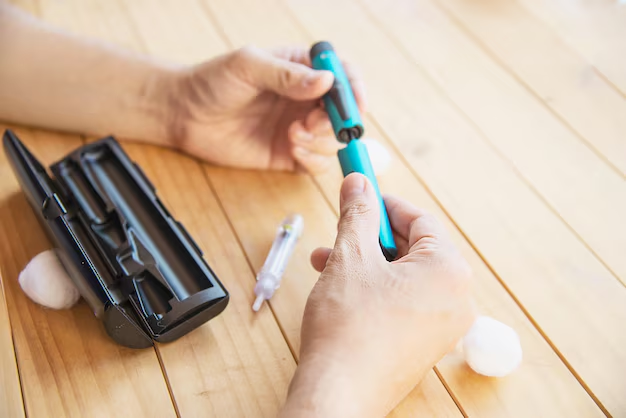Your Guide to How To Diagnose Type 1 Diabetes Vs Type 2
What You Get:
Free Guide
Free, helpful information about Diabetes FAQ and related How To Diagnose Type 1 Diabetes Vs Type 2 topics.
Helpful Information
Get clear and easy-to-understand details about How To Diagnose Type 1 Diabetes Vs Type 2 topics and resources.
Personalized Offers
Answer a few optional questions to receive offers or information related to Diabetes FAQ. The survey is optional and not required to access your free guide.
Understanding the Differences: Diagnosing Type 1 vs. Type 2 Diabetes
Navigating the world of diabetes can be overwhelming, especially when first confronted with the question of whether it's Type 1 or Type 2 diabetes. While both types share the common issue of high blood sugar levels, the causes and characteristics differ significantly. Understanding these differences is pivotal for effective diagnosis and management.
Key Differences Between Type 1 and Type 2 Diabetes
Type 1 Diabetes is primarily an autoimmune condition. It occurs when the body's immune system attacks and destroys the insulin-producing cells in the pancreas. This type is often diagnosed in children and young adults, which is why it's also known as juvenile diabetes. The onset is typically sudden, and individuals may experience symptoms such as extreme thirst, frequent urination, and unexplained weight loss.
Conversely, Type 2 Diabetes is often associated with lifestyle factors such as poor diet, inactivity, and obesity. The body either becomes resistant to insulin or doesn’t produce enough, leading to elevated blood sugar levels. Type 2 usually develops over time and is more commonly diagnosed in adults over 45, but it is increasingly appearing in younger populations due to rising obesity rates.
Diagnostic Steps for Diabetes
Regardless of the type, early diagnosis is crucial for preventing serious complications. Here’s a closer look at how medical professionals differentiate between Type 1 and Type 2 diabetes.
Blood Tests
Glycated Hemoglobin (A1C) Test: This test measures the average blood sugar level over the past two to three months. A normal A1C level is below 5.7%, prediabetes ranges from 5.7% to 6.4%, and diabetes is diagnosed at 6.5% or higher.
Fasting Blood Sugar Test: A fasting blood sugar level less than 100 mg/dL is normal, 100 to 125 mg/dL indicates prediabetes, and 126 mg/dL or higher suggests diabetes.
Oral Glucose Tolerance Test (OGTT): After fasting overnight and consuming a sugary drink, a blood sugar level of 200 mg/dL or higher two hours post-drinking indicates diabetes.
Autoantibody Tests
To confirm Type 1 Diabetes, doctors typically order tests for specific autoantibodies. The presence of these antibodies supports a Type 1 diagnosis and includes markers like the Islet Cell Antibodies (ICA) and Autoantibodies to Glutamic Acid Decarboxylase (GAD).
C-Peptide Test
The C-peptide test is often used to gauge insulin production. Low levels suggest Type 1 Diabetes, while normal or high levels may indicate Type 2.
Financial and Educational Support for Diabetics
Managing diabetes involves medical expenses, lifestyle adjustments, and possibly insulin or medications, leading to significant financial implications. Fortunately, there are numerous resources available:
- Medicare and Medicaid: Government programs that provide healthcare coverage, including diabetes management.
- Pharmaceutical Assistance Programs: Many drug manufacturers offer assistance to those unable to afford medications.
- Health Insurance Marketplace: Offers insurance plans with varying coverage for diabetes care, including preventive services.
- Educational Grants: Programs like the Diabetes Scholars Foundation offer scholarships to those affected by the disease.
- Non-profit Organizations: Groups such as the American Diabetes Association offer resources and support for managing diabetes.
Summary of Resources for Support 💡
- 🎓 Diabetes Scholars Foundation - Scholarships for students impacted by diabetes.
- 🏥 Medicare/Medicaid - Federal programs providing medical coverage.
- 💊 Pharmaceutical Assistance - Aid from drug manufacturers.
- 🏡 Health Insurance Marketplace - Varied insurance plan options.
- 💸 Non-profit Support - Resources from organizations like the ADA.
Understanding and diagnosing diabetes accurately is the first step towards effective management. Leveraging available financial and educational resources can alleviate the burden, allowing those affected to focus on maintaining a healthy and balanced life.
What You Get:
Free Diabetes FAQ Guide
Free, helpful information about How To Diagnose Type 1 Diabetes Vs Type 2 and related resources.

Helpful Information
Get clear, easy-to-understand details about How To Diagnose Type 1 Diabetes Vs Type 2 topics.

Optional Personalized Offers
Answer a few optional questions to see offers or information related to Diabetes FAQ. Participation is not required to get your free guide.


